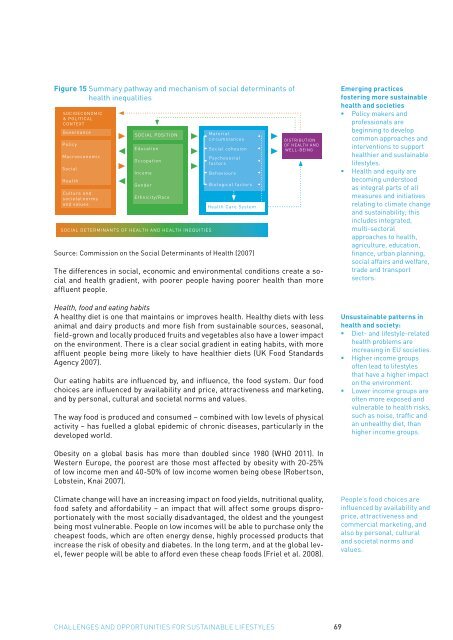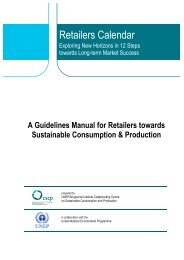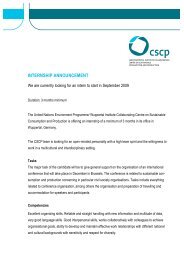today's facts & tomorrow's trends - SPREAD Sustainable Lifestyles ...
today's facts & tomorrow's trends - SPREAD Sustainable Lifestyles ...
today's facts & tomorrow's trends - SPREAD Sustainable Lifestyles ...
You also want an ePaper? Increase the reach of your titles
YUMPU automatically turns print PDFs into web optimized ePapers that Google loves.
Figure 15 Summary pathway and mechanism of social determinants of<br />
health inequalities<br />
SOCIOECONOMIC<br />
& POLITICAL<br />
CONTEXT<br />
Governance<br />
Policy<br />
Macroeconomic<br />
Social<br />
Health<br />
Culture and<br />
societal norms<br />
and values<br />
SOCIAL POSITION<br />
Education<br />
Occopation<br />
Income<br />
Gender<br />
Ethnicity/Race<br />
SOCIAL DETERMINANTS OF HEALTH AND HEALTH INEQUITIES<br />
Material<br />
circumstances<br />
Social cohesion<br />
Psychosocial<br />
factors<br />
Behaviours<br />
Biological factors<br />
Health Care System<br />
Source: Commission on the Social Determinants of Health (2007)<br />
DISTRIBUTION<br />
OF HEALTH AND<br />
WELL-BEING<br />
The differences in social, economic and environmental conditions create a social<br />
and health gradient, with poorer people having poorer health than more<br />
affluent people.<br />
Health, food and eating habits<br />
A healthy diet is one that maintains or improves health. Healthy diets with less<br />
animal and dairy products and more fish from sustainable sources, seasonal,<br />
field-grown and locally produced fruits and vegetables also have a lower impact<br />
on the environment. There is a clear social gradient in eating habits, with more<br />
affluent people being more likely to have healthier diets (UK Food Standards<br />
Agency 2007).<br />
Our eating habits are influenced by, and influence, the food system. Our food<br />
choices are influenced by availability and price, attractiveness and marketing,<br />
and by personal, cultural and societal norms and values.<br />
The way food is produced and consumed – combined with low levels of physical<br />
activity – has fuelled a global epidemic of chronic diseases, particularly in the<br />
developed world.<br />
Emerging practices<br />
fostering more sustainable<br />
health and societies<br />
• Policy makers and<br />
professionals are<br />
beginning to develop<br />
common approaches and<br />
interventions to support<br />
healthier and sustainable<br />
lifestyles.<br />
• Health and equity are<br />
becoming understood<br />
as integral parts of all<br />
measures and initiatives<br />
relating to climate change<br />
and sustainability; this<br />
includes integrated,<br />
multi-sectoral<br />
approaches to health,<br />
agriculture, education,<br />
finance, urban planning,<br />
social affairs and welfare,<br />
trade and transport<br />
sectors.<br />
Unsustainable patterns in<br />
health and society:<br />
• Diet- and lifestyle-related<br />
health problems are<br />
increasing in EU societies.<br />
• Higher income groups<br />
often lead to lifestyles<br />
that have a higher impact<br />
on the environment.<br />
• Lower income groups are<br />
often more exposed and<br />
vulnerable to health risks,<br />
such as noise, traffic and<br />
an unhealthy diet, than<br />
higher income groups.<br />
Obesity on a global basis has more than doubled since 1980 (WHO 2011). In<br />
Western Europe, the poorest are those most affected by obesity with 20-25%<br />
of low income men and 40-50% of low income women being obese (Robertson,<br />
Lobstein, Knai 2007).<br />
Climate change will have an increasing impact on food yields, nutritional quality,<br />
food safety and affordability – an impact that will affect some groups disproportionately<br />
with the most socially disadvantaged, the oldest and the youngest<br />
being most vulnerable. People on low incomes will be able to purchase only the<br />
cheapest foods, which are often energy dense, highly processed products that<br />
increase the risk of obesity and diabetes. In the long term, and at the global level,<br />
fewer people will be able to afford even these cheap foods (Friel et al. 2008).<br />
People’s food choices are<br />
influenced by availability and<br />
price, attractiveness and<br />
commercial marketing, and<br />
also by personal, cultural<br />
and societal norms and<br />
values.<br />
Challenges and opportunities for sustainable lifestyles 69
















